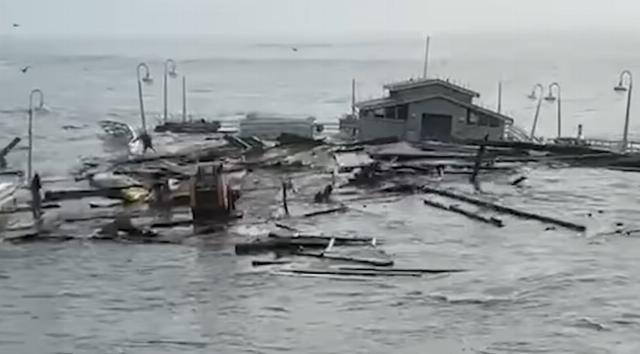Environmentalism isn’t just ‘pro-Nature.’ It’s also anti-human.
When I was in high school, there were posters all over showing beautiful white baby seals about to be clubbed to death. The message was clear: We must save Nature from human depredations. And back in the day, when lakes were burning, skies were brown, and water was toxic, that wasn’t a bad idea. Now, though, environmentalism has transformed from something meant to balance the world for both humans and animals to a purely anti-human belief system. Two news stories nicely show how this works.
Santa Cruz is almost exactly halfway down California’s coastline. It’s a nice little town, which is home to UC Santa Cruz (a bat-fecal-matter-crazy leftist UC campus, even by UC standards) and tourist attractions. These attractions range from high-end restaurants and nearby wineries to the Santa Cruz Beach Boardwalk, California’s answer to Coney Island.
Santa Cruz also has a famous wharf “known for fishing, boat tours, viewing sea lions, dining, nightlife, and gift shops.” Up until recently, the wharf, which was built in 1914, was the West Coast’s longest pier.
But as I said, that was up until recently. Things have changed quite abruptly, too:
[On December 23] A portion of the Santa Cruz Wharf has collapsed and is floating away Monday, according to the National Weather Service. Three construction workers went into the water when the pier section collapsed, according to the Santa Cruz Police Department.
Two of them were rescued by lifeguards, and a third person self-rescued. All three were treated and released, according to Santa Cruz Fire Department officials.
You can see pictures of the collapse here, and they’re impressive.
What I found amusing was the probable cause behind the wharf’s collapse—environmentalism:
City officials revealed that environmental orders meant to protect the seaside birds have hindered essential repairs to the 110-year-old structure, according to Mercury News.
When a portion of the pier deteriorated and plummeted into the ocean during a major storm on Monday, the structure was still damaged from storms from two years ago. But those repairs were put off because of seagull protections.
Mercury News reported that critical aspects of repair work, including fixing the pillars holding up the wharf, were delayed by environmental activism efforts.
Due to rules implemented by the Coastal Commission, renovations and repairs can only be done between September and March to avoid seagull nesting season.
The reverence for seagulls is surprising. Notwithstanding the anthropomorphism of Jonathan Livingston Seagull (a book I despised as a child, probably revealing my nascent anti-leftism), Seagulls are giant flying rats.
They’re beautiful, and they are good at cleaning up garbage, but they’re also aggressive and omnipresent. When I was in junior high at a school less than three miles from the Pacific, the birds patrolled the schoolyard at lunchtime, snatching food from our hands and unloading their gastrointestinal waste on our heads.
But for the California Coastal Commission, which is reflexively hostile to humans, seagulls rule.
It’s not just in California, though. In England, badgers rule:
Imagine being told your safety is less important than that of a badger’s.
That is the reality for Leigh-on-Sea residents who say they were “overrun” by the striped creatures causing damage to their roads and putting residents’ multi-million pound seaside properties at risk of slippage.
The row cost the council £2m and forced officials into an arduous six-month wait for a licence from Natural England to move them on.
It is little wonder that locals are up in arms over the issue.
[snip]
It all relates to a law dating back to the 1990s which makes it illegal and therefore punishable by prison time to disturb them without a licence.
Activists say the nocturnal animals have historically faced “unprecedented levels of persecution”. Sir Brian May, Queen guitarist-turned-poster-boy for badgers’ rights, said badgers were “as important to me as music”.
But the scope of the law protecting these tunnelling, weasel-like mammals has not come without its consequences for humans.
In the Bible, God made man a steward of the animal kingdom. That means that man is master over the kingdom, but with that mastery comes responsibility. He must not destroy it.
However, the environmentalists, who are part of the leftist movement to reject all Judeo-Christian beliefs, have no concept of reciprocal obligations. To them, humans, which have clawed their way to the top of the food chain, are no longer a part of nature. They are outside nature and must be destroyed—and the environmentalists will stop at nothing to make it happen.

Image: YouTube screen grab (cropped).





